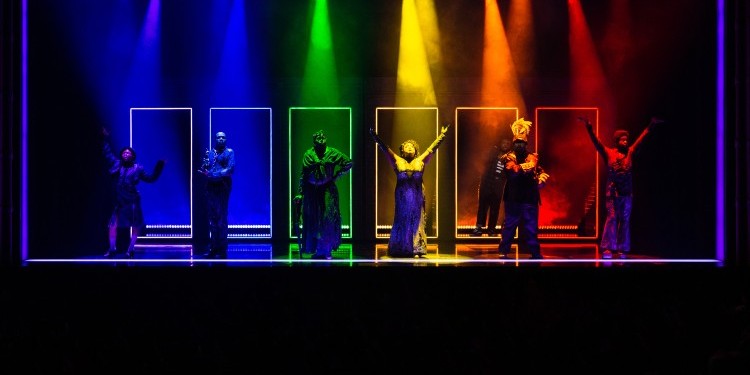‘A Strange Loop’ writer Michael R. Jackson on the show’s 11 Tony nominations and the importance of new musical theatre
Jackson's show is nominated for Best Musical, and he is nominated for his book and score.
When Pulitzer Prize winner Michael R. Jackson was in high school, he wrote a short story called "Big Girls" about a girl who wants to explore sex because her older sister is doing it. However by then, sex is already uncool. "Pussy is out, Puritan is in" is the exact final line of the story, according to Jackson, which he read aloud at his public library in Detroit in front of his parents.
There's something unsurprising about that story if you've seen A Strange Loop, Jackson's musical that won him the Pulitzer, a slew of Off-Broadway awards, and now 11 Tony nominations, the most of any show this year. He employs a similar brand of R-rated humor to tell the story of Usher, a quasi-representation of his own younger self who used to work as a Broadway usher to pay the bills. He struggles with insecurities at every turn, personified by an ensemble of six Thoughts, about his ability to professionally, sexually, romantically, and personally succeed in a world that's especially harsh on Black, gay men.
However, from the opening anecdote, Jackson seems anything but insecure. After all, it takes guts to read a sexual dark comedy story in front of your parents (though he did beg them not to come). His confidence also comes across in A Strange Loop's exuberant tagline — "A big, Black, queer-ass American musical!" Exclamation point included.
A Strange Loop owns what it is, but that only came with Jackson becoming more comfortable in his own identity as he developed the show from a monologue to a musical over more than a decade. He once collaborated on a musical for five years that he "had no business working on," but did it because, well, he could. (Usher, similarly, reluctantly takes a ghostwriting gig for Tyler Perry.) He's not opposed to working on others' shows or adapting existing source material if it's the right fit, but an original musical allowed him to find himself and join a tradition of trailblazing new work.
"[The Tonys are] an institution that's also celebrating the [history] of musical theatre, and that's a tradition that I feel my show is a part of," Jackson said. "A lot of people focus on the big, the Black, the queer-ass, and the Broadway but they skip the American. And the truth of it is, I'm participating in an American form, and the musical theatre form is a uniquely American form."
Below, Jackson talks more about A Strange Loop, being a young artist, and how audiences have reacted to his show.
Get A Strange Loop tickets now.
How did you start writing?
I took creative writing as my elective all four years of high school. My teacher, Miss Deborah Thompson, brought in this program called "Inside Out" that brings professional writers into creative writing classes to give young people an outlet, but also to show that writing can be more than a hobby. That really set a course for me because I got to work with writers in residence all four years of high school.
One of them was this novelist, fiction writer, and poet named Peter Marcus, who was the first adult artist in my life to encourage me to push the envelope of what I was writing, to step out of my comfort zone, to identify what my obsessions were, and not give myself a plan B as far as being an artist.
Did any particular shows inspire you as a young artist?
When I was 13 years old, my mother let me skip school on a Friday and me, her, and my grandmother took the train to Toronto to see the national tour of Show Boat. It blew my mind. I had never seen something of that size and scope and trying to tell a deep story, and I was very moved by it. I wasn't trying to write musicals at that time, but I do think that it lit a fire in me and showed me that musical theatre could be more than just jazz hands.
A year or so later, we saw the musical adaptation of A Raisin in the Sun, Raisin, which won the the Tony in 1974. To this day it's in my top five — I love it so much. That original Broadway cast album is everything, that score is everything, Joe Morton singing for the gods in a way that a lot of singers don't do on Broadway anymore. And also, the subject matter of it was so well-written.
When I did get to musical theatre, I wanted to write shows like that, or like A Chorus Line, that have a kind of excellence to them, that have nuance and complexity to them.
What kept you going and creating while you were working as an usher?
The thing that kept me going was trying to understand the experience of Usher. I did draw from personal experience to write it, but at a certain point, it became not about me. It became about the idea of "me," of "I," of "self." I wanted to try to capture that Black, gay self-image, the nuance of it, the specificity of it. I felt if I could do it on the level of other pieces of art I felt moved by, that would move the needle somehow. I couldn't understand the loop, and so I stayed in it.
What do the Thoughts, and the actors who play them, bring to Usher's story?
For many years, the the characters who are now known as the Thoughts were amorphous and didn't really have an identity. Once [director] Stephen Brackett came on and suggested that we cast it with all Black and queer folks, I was intrigued by that concept. It immediately charged the piece with something different.
By virtue of the actors who we brought into it, it became their story as well. That has been a really exciting thing to witness through the Thoughts because James Jackson, L Morgan Lee, John-Michael Lyles, Jason Veasey, Antwayn Hopper, John-Andrew Morrison, they all have been with this piece, some of them as long as 2008. It's given me time working with them to understand their minds, bodies, hearts, spirits, and to write toward their strengths.
It has been definitely exciting to have brought the understudies into this process this time around because then suddenly, there are new bodies and hearts and minds and spirits, and the piece conforms to them in its own little way and expands.
Usher can't tell his story without the Thoughts. They're intrinsic to him, and the Thoughts can't exist without him.

How else have you and your musical grown and changed since the show opened off Broadway?
Every time I would change, A Strange Loop would change, and every time A Strange Loop would change, I would change. The art and the life are very linked. That's why for many years, I was generating a ton of content for Usher, but I couldn't understand the story because I, in my own life, had not reached a place where I felt worthy. I had to get to a place where I recognized my own self-worth in order to understand what Usher's "problem" was. Once I got to that place, I could tell his story with more authority, clarity, and completeness.
What went through your mind when you found out about A Strange Loop's 11 Tony nominations?
I felt really validated, that all the years and the hours and the time that I spent working on one piece of art was being rewarded, taking my time was being rewarded with the nomination for a Tony. That, to me, felt like a win for the form. We live in a fast-paced, product-oriented world and everybody, especially a lot of young people, are often conditioned to think that you put something on a conveyor belt and then you profit from it right away. My story is an example of how it takes time, and that it's worth it to take the time.
Why is it so important to you that A Strange Loop is accessible to as many people as possible?
A Strange Loop is a show that began when I felt, as a young person, unseen, unheard, misunderstood. I wanted to capture that feeling of alienation in a jar and offer that to an audience. I think young people, who often feel the same sorts of feelings — and also older people — getting to share that with a younger audience is important because they can see that their stories, their points of view, their perspectives are valid and worth exploring and dramatizing in a musical.

What do you think is the key for an original show to resonate with people?
I don't have a handbook for that, but staying true to yourself as an artist in whatever you create. People often ask me, did I have to change anything for anybody? And the answer was no. And I think part of the reason for its success is that I had a vision and I stuck to it. It doesn't mean that I didn't make changes, but I didn't make changes for commercial reasons or for palatability reasons. I did it fully in service of the story and of the actors telling the story and honoring audiences.
Something that I think is very important, that I try to do as a theatre writer, is to realize that I'm writing things for an audience. Which doesn't mean I pander to them, but it means I consider how they will receive the material and try to make sure I say what I mean and I mean what I say, so when the audience receives it, they can take something away from it that is not a static experience. It's live theatre, it's people in space, in time, breathing the same air. I have to lean into the gravity of that.
Have Broadway audiences reacted to A Strange Loop differently than Off-Broadway audiences?
Audiences have reacted similarly, with open-mindedness, open-heartedness. The amount of people who have come up to me and told me what the show means to them has been astounding. I had an experience the other day where... a man came up to me, and he told me that he was from a very conservative family that wasn't very accepting of his sexuality. He had, for years, been trying to get through to them. And then he finally brought some of them to see the show, and then it began a dialogue in their family. That was very moving to me because that's the kind of thing you can't manufacture.
As someone who prepared the piece from a place of feeling alone, to think that I and my collaborators made something that makes people feel less alone in the world, what's better than that?
Get A Strange Loop tickets now.
This interview has been condensed and edited for length and clarity.
Photo credit: Zack DeZon
Originally published on
